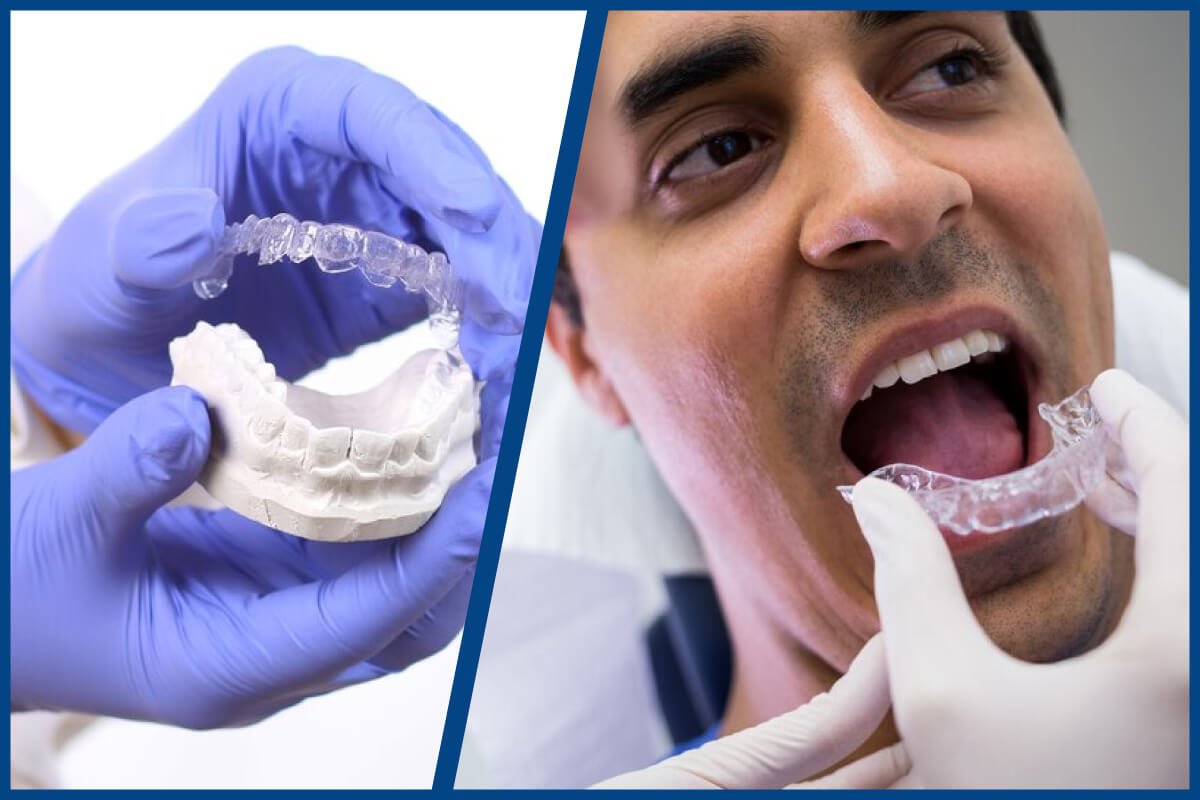If you experience a sore jaw or headaches, you may be grappling with bruxism – a problem commonly referred to as teeth grinding. Despite its prevalence, many individuals find themselves unwilling to seek out remedies for this condition.
Don’t worry, there may be a solution to address all of these issues: night guards. This comprehensive guide outlines the pros and cons of using night guards, as well as the different types available on the market and their costs. Armed with this knowledge about these dental devices, you will be better equipped to discuss your options with your dentist and find relief for symptoms related to teeth grinding or bruxism!
DIFFERENT TYPES OF NIGHT GUARDS
There are different types of night guards available, and each comes with its advantages and disadvantages. Let’s examine them in detail:
1. OVER-THE-COUNTER NIGHT GUARDS (OTC)
These night guards are available without a prescription and are commonly known as OTC night guards. They can be conveniently purchased at drugstores or sports supply stores. OTC night guards are typically more affordable due to their production with less resilient materials. They offer either one-size-fits-all or boil-and-bite alternatives for customization purposes.
2. CUSTOM-MADE NIGHT GUARDS
A professional will uniquely design these guards for you, often in a laboratory. They are created to fit your specific mouth shape and offer superior comfort, durability, and performance. There are multiple types of custom-made night guards that you can select from that will cater to your individual needs or preferences.
- Soft dental guards: These are crafted from pliable plastic and are best for people who grind their teeth forcefully. Nonetheless, they may not endure extended use as the soft material tends to deteriorate faster.
- Hard-mouth Night Guards: These, on the other hand, are made of more resilient substances like acrylic and suit individuals who clench or grind excessively hard. Despite being less flexible than their softer counterparts, these devices have a longer shelf life. However, if any alteration occurs in your dental structure, further adjustments might be necessary.
- Dual laminated Night Guards: These merge both types of materials into one, offering comfort and sturdiness.
- Thermoplastic Night Guards: These orthodontic devices can modify themselves upon warming up for an ideal fit over your teeth. This results in more comfortable wear even after prolonged usage. Thermoplastic night guards are also hypoallergenic for those worried about sensitivities toward such things.
COSTS OF NIGHT GUARDS
In case you have a limited budget, there are night guards available at your nearby drugstore without the need for prescriptions. They may be less expensive but not as long-lasting since they’re made from materials that are prone to wear and tear. The cost would range approximately between $200 – $1,000. However, these prices can vary based on the materials used, the dental professionals‘ fees, and your insurance plan’s coverage.
If you are willing to spend a little extra money, custom night guards are the best option. They fit your mouth perfectly and provide excellent comfort and protection. Although they may be pricier initially (usually ranging from $300-$800), their long-lasting durability means that they’re an intelligent investment in the future.
PROS AND CONS
It’s important to be aware of both the advantages and disadvantages of wearing night guards.
PROS
Using night guards can minimize the possibility of tooth damage caused by bruxism, and it could also ease jaw discomfort along with other symptoms related to teeth grinding. By wearing a night guard, you can acquire the following advantages:
- Regular use of a night guard can protect your teeth from damage caused by clenching and grinding. By wearing it, you may reduce the risk of chipping, flattening, breaking or loosening your teeth, as well as prevent excessive wear on tooth enamel.
- In addition to protection against dental harm, using a night guard could also help relieve pain associated with bruxism, such as toothache, jaw discomfort, headache and cheek irritation. Furthermore, it prevents the development of even more painful conditions like TMJ disorders.
- Sleep disruptions are common for individuals suffering from bruxism. However, wearing the custom-fitted high-quality night guard can allow you to fall asleep easily in a few minutes without disrupting your sleep at all
CONS
Comfort is crucial when it comes to nightguards, particularly those that are customized to fit your mouth precisely. However, selecting a pre-made mouthguard could result in discomfort and an improper fit. It’s one of the most significant drawbacks of using such guards. Therefore, choosing a custom-fit option is essential for avoiding any uncomfortable experiences with these devices.
END NOTE
Individuals suffering from bruxism or teeth grinding can find relief and protect their dental health with the help of night guards. A variety of options are available to cater to different needs and budgets, ranging from store-bought to custom-made guards. While over-the-counter solutions are affordable, customized ones provide greater comfort while offering optimal protection due to their tailored fit.
Hence, investing in a personalized night guard can be extremely beneficial for you in the long run, considering durability and effectiveness. However, some individuals may experience moderate discomfort using readily available versions. But this far outweighs the advantages of night guards, as they prevent tooth damage, relieve jaw pain and enhance sleep quality. Nevertheless, a consultation with your dentist is still necessary when you’re choosing an appropriate type that suits your requirements for combating bruxism!











